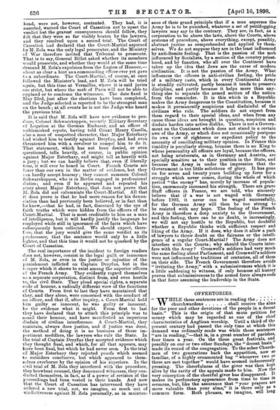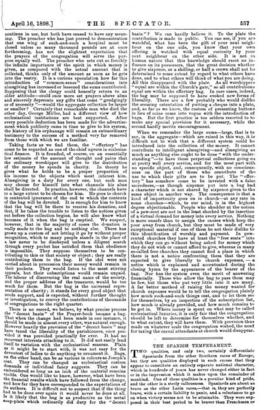OFFERTORIES.
" WHILE these sentences are in reading the - - - churchwardens shall receive the alms for the poor and other devotions of the people in a decent basin." This is the origin of that mute petition for money which may be regarded as one of the chief characteristics of Anglican worship. Until a third of the present century had passed the only time at which this demand was ordinarily made was while these sentences "are in reading,"—that is, in a great number of parishes, four times a year. On the three great festivals, and possibly on one or two other Sundays, the "decent basin" made its round of the congregation. To the sober Church. men of two generations back the apparition, now so familiar, of a highly ornamented bag " whenever two or three are met together" would have seemed indecorously pressing. The cheerfulness of the giver was then kept alive by the rarity of the appeals made to him. Now the very conception of the cheerful giver has disappeared. It makes its perfunctory appearance from time to time in sermons, but, like the assurance that "your prayers are more valuable than your alms," it is there only as s common form. Both phrases, we imagine, will long continue in use, but both have ceased to have any mean- ing. The preacher who has just proved to demonstration that one wing of such-and-such a hospital must be closed unless so many thousand pounds are at once forthcoming, has not the slightest expectation that the prayers of the congregation will serve the pur- pose equally well. The preacher who sets out so forcibly the infinite importance of the spirit in which money is given, as compared with the actual amount that is collected, thinks only of the amount as soon as he gets into the vestry. It is a curious speculation how far this introduction of " common-sense" considerations into almsgiving has increased or lessened the sums contributed. Supposing that the clergy could honestly return to an older attitude—could once more set prayers above alms and sincerely deprecate any gifts that come " grudgingly or of necessity "—would the aggregate collection be larger or smaller ? Certainly that remarkable man who died the other day, George Muller, had a different view of how ecclesiastical institutions are best supported. After every possible deduction has been made for the advertise- ment which publicity came in time to give to his system, the history of his orphanage will remain an extraordinary testimony to the success of a method very far removed from those with which we are familiar.
Taking facts as we find them, the " offertory " has come to be regarded as one of the chief agents in ecclesias- tical finance. It is founded, of course, on an essentially low estimate of the amount of thought and pains that the ordinary worshipper will give to the distribution of the money he spends in charity. In theory he gives what he holds to be a proper proportion of his income to the objects which most interest him. Almsgiving is a duty for every one, but each man may choose for himself into what channels his alms shall be directed. In practice, however, the channels have to a large extent to be chosen for him. He goes to church in contented ignorance of the end to which the contents of the bag will be devoted. It is enough for him to know that the bag will be there to receive his donation, and that, if he takes the trouble to listen to the notices given out before the collection begins, he will also know what becomes of it when the bag is emptied. We suspect, however, that in the majority of cases the donation is really made to the bag and to nothing else. There has grown up a custom of not letting it go by without proper recognition, which to many people stands in the place of a law never to be disobeyed unless a diligent search through every pocket has satisfied them that obedience is impossible. They suppose themselves to be con- tributing to this or that society or object ; they are really contributing them to the bag. If the idol were not carried about in procession their money would remain in their pockets. They would listen to the most stirring appeals, but their subscriptions would remain unpaid. The labour of discovering the real name of the society, and the proper address of the treasurer, would be too ranch for them. But the bag is the universal repre- sentation of charity ; it stands for every good object that needs support, and is expected, without further thought or investigation, to convey the contributions of thousands of congregations to the right quarter.
There is no record, we believe, by what precise process the "decent basin" of the Prayer-book became a bag. That when the change had been made in one instance, it should be made in almost every other, was natural enough. However heavily the provision of the " decent basin " may have taxed the liberality of the parishioners, once pro- vided it was provided practically for ever. It had no recurrent interests attaching to it. It did not easily lend itself to variation with the ecclesiastical seasons. Plain as it might be to start with, it was not easy for the devoutest of ladies to do anything to ornament it. Bags, on the other hand, can be as various in colours as Joseph's Coat. They can be changed as ecclesiastical custom demands or individual fancy suggests. They can be embroidered so long as an inch of the material remains visible. One would like to know, however, what have been the financial results which have followed from the change, and how far they have corresponded to the expectations of its authors. It is difficult not to suspect that if the thing had to be done over again it would never be done at all. Is it likely that the bag is as productive as the metal soup-plate which ordinarily did duty for the "decent basin " ? We can hardly believe it. To the plate the contribution is made in public. You can see, if you are watchful, what has been the gift of your next neigh- bour on the one side, you know that your own offering is watched with equal curiosity by your next neighbour on the other side. It is not in human nature that this knowledge should exert no in- fluence on its possessors, that the great decision whether to give sixpence, or a shilling, or half a crown shall not be determined to some extent by regard to what others have done, and to what others will think of what you are doing. All this disappeared with the plate. As all worshippers "equal are within the Church's gate," so all contributions equal are within the offertory bag. In rare cases, indeed, the bag may be supposed to have evoked new forms of liberality. There are a. few probably who would dislike the seeming ostentation of putting a cheque into a plate, and, so far as we know, the custom of presenting buttons in lieu of coins came into vogue with the introduction of bags. But the first practice is too seldom resorted to to make any special provision for it necessary, while the second hardly merits encouragement.
When we remember the large sums—large, that is to say, in the aggregate—which are raised in this way, it is difficult not to wish that a different system could be introduced into the collection of the money. It cannot contribute to intelligent almsgiving—and almsgiving as much as anything else ought to be done " with the under- standing "—to have these perpetual collections going on at pretty well every service, and for the most part with no specific object, and, consequently, with no conscious- ness on the part of those who contribute of the use to which their gifts are to be put. The " offer- tory " has somehow come to be invested with a false sacredness,—as though sixpence put into a bag had a character which is not shared by sixpence given to the same object in another way. The consequence is that a kind of importunity goes on in church—at any rate in some churches—which, to our mind, is in the highest degree objectionable. People who shudder at the notion of a pew-rent are not in the least shocked by the insertion of a virtual demand for money into every service. Nothing is more unsafe than to assign the causes which keep the poor away from church, but they must be made of very exceptional material if one of them be not their dislike to this identification of worship and payment. In pew- rented churches they have at least the " free seats " into which they can go without being asked for money which they do not wish or cannot afford to give, whereas in many so-called free churches they cannot find a place in which there is not a notice confronting them that they are expected to give liberally to church expenses, — a notice which is explained and accentuated during the closing hymn by the appearance of the bearer of the bag. Nor has the system even the merit of answering financially. Those who allow the bag to pass them may be few, but those who put very little into it are many. A far better method of raising the money wanted for church expenses would be to tell the congregation plainly how much such-and-such things cost, and to let them see for themselves, by an inspection of the subscription list, how much is already provided, and how much remains to be got in. Where money is spent on what may be called ecclesiastical luxuries, it is only fair that the congregation should be left to determine for themselves whether, and to what extent, they will have them. With provision thus made on whatever scale the congregation wished, the need for taxing the casual attendants at church would disappear.



































 Previous page
Previous page